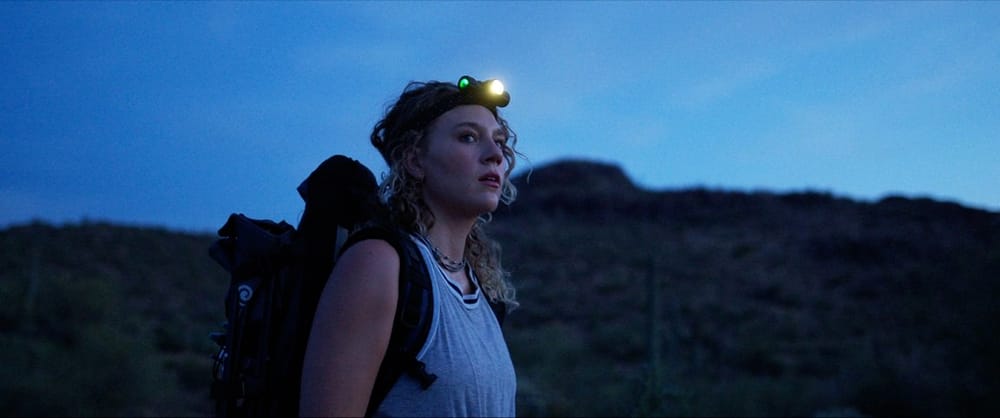There’s something quietly radical about a film that allows mystery to remain unsolved, that dares to wander, to ask questions without needing to answer them. Star People, the debut feature from writer-director Adam Finberg, is that kind of film—a strange, tender, and resonant road trip through memory, trauma, family, and the shimmering unknown.
In 1997, Claire saw something in the sky that changed her forever. While the world called it the Phoenix Lights, she saw it as a sign—something real, something calling to her. That one night became the anchor for the rest of her life, a mystery she couldn't stop chasing. Now an adult, she’s a photographer shaped by silence and seizures, with a past that still clings to her skin.
Setting off into the desert with her troubled brother Taylor and her influencer boyfriend Justin, Claire hopes to find answers—or at least, a glimpse of the light that started it all. Taylor carries the weight of their shared childhood, while Justin turns belief into content. But for Claire, this journey is no stunt. It’s a quiet reckoning. A search not just for what might exist beyond the stars, but for the pieces of herself she lost along the way.
What unfolds is less about UFOs than what believing in something—anything—does to a person. Claire believes because she needs to. Justin believes because it benefits him. Taylor doesn’t believe at all, at least not until belief becomes a form of grace. That’s the beauty of Star People: it uses the language of science fiction to speak intimately about something far more terrestrial—the jagged edges of human connection.
Finberg’s script is surprisingly layered, weaving together the search for extraterrestrial life with the quieter search for familial understanding. Along the journey, they encounter an immigrant father and daughter—Ricardo (Eddie Martinez) and Gabby (Adriana Aluna Martinez)—on the run from border patrol. Their presence shifts the emotional gravity of the film. Suddenly, this isn’t just a ghost chase through the sky; it’s a mirror held up to the earth. What are we running from? What are we hoping to find?
There’s a specific kind of loneliness that fills the desert, and cinematographer Aiden Chapparone captures it with a reverence that’s rare in indie cinema. The way he frames the horizon—endless, unknowable—feels like an open wound and a quiet invitation. You get the sense that if the sky could speak, it might say, “Keep going.” And Claire does. Not because she expects answers, but because the journey itself might be the answer.
The performances are uniformly strong, but it’s Cunning and Slye who leave the deepest mark. Claire and Taylor carry the bruises of a shared past that neither can quite look at directly. Their interactions oscillate between tenderness and fury, love and exasperation. There’s one scene—late at night, when the heat has worn everyone thin—that cracked me open a little. It's not loud, but it doesn't need to be. It’s just two broken people, trying to remember how to hold each other without hurting.
And then there’s Justin, the outsider looking in. Paolo plays him with a kind of oblivious charm—he’s grating, yes, but never cartoonish. His presence is both comic relief and cautionary tale. He believes in aliens the way some people believe in brand deals: temporarily and strategically. But even he isn’t written off. In this film, everyone is given the chance to be more than their surface.
What makes Star People stand out is how it resists the urge to go over the top. While there are moments of tension, touches of politics, and hints of suspense, the film stays grounded. At its heart, it’s thoughtful and quiet—more focused on human connection than flashy visuals. It leans into the pauses, the unspoken, and allows the mystery to linger, trusting the audience to sit with the unknown rather than demanding easy answers.
The title Star People might conjure up images of aliens and galactic visitors, but it’s really about us—the flawed, hopeful, starry-eyed humans who look up at the night sky and wonder if there’s more. And in doing so, we’re really just searching for each other, for meaning, for forgiveness.
It’s rare to find a debut this assured, this emotionally intelligent, and this beautifully made on such a modest budget. Finberg isn’t just making a film about UFOs—he’s making a film about belief, grief, survival, and healing. And that is far more mysterious, far more powerful, than any flying saucer.
There’s a line from Leonardo da Vinci that floats around the film like a prayer: “He who is fixed to a star does not change his mind.” Claire never does. And neither does the film. It knows exactly what it wants to say and says it, gently but clearly, with a full heart and open eyes.
Star People may not be the flashiest film this year, but it’s one of the most heartfelt. In a time when movies often chase big effects and loud moments, this one gently reminds us that sometimes, all we need is a meaningful story, a little heartbreak, a sky full of stars—and the bravery to keep going.
Director: Adam Finberg
Cast: Kat Cunning, McCabe Slye, Connor Paolo
Writer: Adam Finberg
Producers: Adam Finberg, Josh Shader
Composer: Reza Safinia
Cinematographer: Aiden Chapparone
Editor: Tyler Schneider

